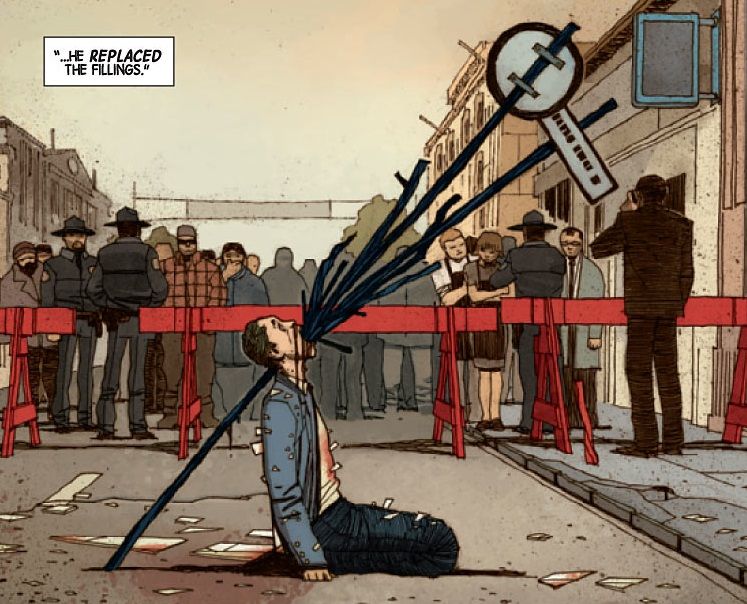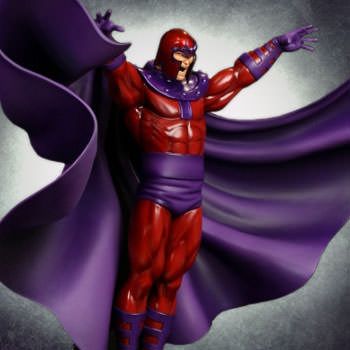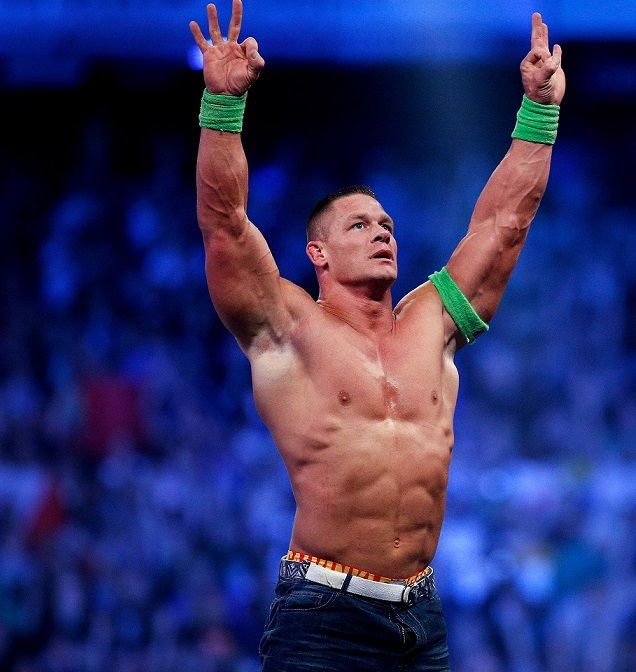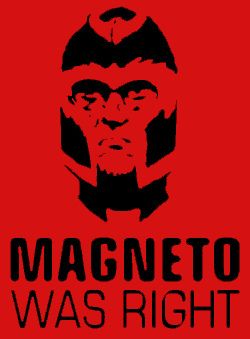Happy Wrestlemania weekend, everybody!
Sports entertainment and comic books are like cookies and milk these days, what with pro wrestlers stepping into the writers' chair from time to time to the Marvel offices being huge marks for the WWE. We've hosted quite a few Wrestlemania previews on ROBOT 6, and as the Super Bowl of wrasslin' ramps up to the inevitable Mania on Sunday, my mind's been particularly preoccupied with the most entertaining of sports.
Which is why I saw the above panel from Magneto #1, viscerally drawn by the incredibly talented Gabriel Hernandez, and thought to myself, Huh, that reminds me of John Cena.
Not because I hate Cena and want to see a bunch of things impaled in his mouth, mind you. This image reminded me of him because of the righteous fury with which this act was taken. Both the supervillain Magneto and the super-face John Cena have this one strong thread between them, stirring passionate reactions in fans. One is treated as a blight on the narrative and the other a misunderstood good guy among his peers, and those roles aren't what they seem at face value. Let me explain ...
Righteousness, if I can get a little fourth-grade book report for a second, is acting in accord with moral law or simply from an outraged sense of justice. To be self-righteous is to view your moral code as superior to anyone else's beliefs. On the surface, neither of these seems to be evil or bad at the outset. Do you have a sense of morality and elevate that code to be the final word on right and wrong? Everyone likely does from time to time.
Magneto is super-righteous to the point of being self-righteous, where his views and laws supersede those of anyone else. It's why he can murder a man in broad daylight and leave him impaled in the street, as seen above. Magneto believes that mutant kind is superior to human kind, and all mutants should be preserved above their lessers. He acts toward this belief, but still holds to a code that can sometimes stop him short of becoming a complete monster. He has allies and friends, and tried to connect to his children (when they still were his children), but all of that allegiance pales in comparison to his ultimate goal. He will take an island and create a mutant homeland or he'll teach at a school for mutants because those acts fall within his code. This man is a villain.
John Cena is a professional wrestler who's been the WWE's main "good guy" character for more than a decade. He's also righteous, but in a far less-focused fashion. If the man could be said to have a moral code, it's his omnipresent catchphrase of "Hustle, loyalty, respect." These are more a list of traits than a manifesto, but it's what we have. Every night he's on television, Cena acts to succeed, strangely enough by any means necessary. For example, on Sunday he 'll face Russian bad guy Alexander Rusev to win the U.S. Championship belt. Cena got this match by choking Rusev into unconsciousness while a woman begged him to stop. He has a moral code and will stand by it; when another man led Cena's team to victory at Survivor Series, Cena raised is hand and gave him credit. Awkwardly, when a bad guy threatened to stomp on the neck of an injured man unless Cena gave him what he wanted, Cena relented rather than see him get hurt. Cena is a hero to children and sets records with the Make-a-Wish Foundation, helping those less fortunate. This man is a hero.
Smart fans love Magneto. I remember when X-Men: First Class came out, and everyone talked about how cool Magneto was and how they could watch a whole movie of him killing Nazis. "Magneto Was Right" T-shirts straight out of the comics are worn by some of those who want to buck authority. In a way, we all want to be Magneto because he gets stuff done. If someone wrongs him, he fights back. If society casts him out, he makes war on society. He's a bad guy who kills bad guys. When a character is really righteous, we feel that sense of morality from them and it's easy to forget how wrong Magneto's tactics are and how much of that moral code is self-serving.
Smart fans (or "smarks") hate John Cena. He always wins, he thinks he's better than everyone, he does the same thing all the time -- the list of his sins are recited repeatedly on message boards. But he gets stuff done. He hustles, and he's loyal to and respects his fans. In a way, his righteousness can come across as an authority over the WWE, a show where the Authority is the literal name of their bad guys. His motives are pure; he wants to wrestle for his fans. It doesn't matter if you're there to cheer or boo him, as long as you're entertained, Cena feels he's doing his job. However, his methods are off-base and don't seem to match his code.
Here's the kicker, folks: As much as he might get things right from time to time, as much as we may even agree with his take-no-prisoners approach, we know Magneto is a villain. He was created as a villain, he comes from a villainous place, and we saw him first pitted against heroes that we were ready to root for. Sure, we can see ourselves in him from time to time, and we can live vicariously through his righteous actions, but there's still a moral divide between Magneto and us.
Now keeping in mind that he's a fictional character and wrestling isn't wrestling, John Cena is written to be the hero. His actions should be heroic and good, and therefore, we should agree with what he does. John Cena should be good, but we don't agree with him. His commitment to his code makes us hate him even more. If Cena is going to be the hero of our wrestling story, we should at least sympathize with him, and it's hard to sympathize with a guy you don't agree with. After all, fans can get a little righteous ourselves when it comes to who we cheer and who we boo.




